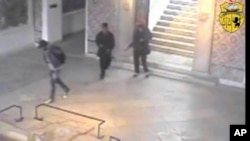A Moroccan national who arrived in Italy illegally by boat with migrants has been arrested in connection with the March 18 terror attack on a landmark Tunis museum that left 22 dead.
Italian counter-terror officials are not saying how Tuil Abdelmajid, also known as Abdal, is alleged to be connected with the Bardo attack, but the head of Italy's anti-terror police, Bruno Megale, told reporters at a news conference in Rome Wednesday that the 22-year-old was wanted on an international warrant issued by Tunisian authorities.
Abdelmajid was arrested Tuesday evening in the Italian village of Gaggiano, southwest of Milan, where his mother and two older brothers live. The arrest warrant states he is wanted for premeditated murder, kidnapping and terrorism.
Most of those gunned down in late-March attack were tourists, among them four Italians. One Tunisian policeman was killed in the assault, and two Tunisian assailants were killed after they briefly took hostages and fled into the museum. Tunisian authorities insisted in the hours after the attack that there was a third gunman.
According to Italian police, Abdelmajid smuggled himself into Italy aboard a vessel with 90 other migrants in February before the attack. It remains unclear whether Tunisian authorities are alleging he was involved only in planning the assault, or whether they believe he returned to Tunisia to join the assault and then traveled illegally once more — a scenario that analysts in Rome say is unlikely.
Either way, the fact that an alleged jihadist managed to enter Italy and mingle with migrants who landed on the Italian island of Sicily is causing consternation in Rome and has prompted an outcry from anti-immigration politicians. The head of the Northern League party, Matteo Salvini, is now calling for the suspension of the Schengen agreement that allows people to move freely across most European Union state borders without passport and customs checks.
“Libyan intelligence says boats are arriving with Islamic State terrorists," Salvini said on Italian television. "Today in my Milan, a north African was arrested for involvement in the Tunisian massacre. Close the borders before it’s too late.”
Daniela Santanchèa, a lawmaker from former Prime Minister Silvio Berlusconi’s Forza Italia party, accused Italy’s left-wing government of failing to protect the country. It is “unbelievable that this government, instead of defending us from cut-throats, has transformed Italy into a useful platform for terrorists,” Santanchèa argued.
Their criticism is likely to receive loud support from anti-immigration politicians from other EU countries who have warned that terrorists can use the Mediterranean migrant crisis to infiltrate Europe by posing as economic migrants or refugees fleeing war. In April, Britain’s Nigel Farage, head of the UK Independence Party, said during a fiery debate in the European parliament that refugees from North Africa pose a “real and genuine terror threat.”
About 10,000 refugees try to gain entry into Italy every week on people-smuggling boats. About a thousand recently have drowned making the perilous crossing.
Abdelmajid was issued with an expulsion order by Italian authorities after he snuck into the country. Police tracked him to Gaggiano because his mother had reported his passport missing. “A Moroccan national, wanted internationally, was arrested [Tuesday] evening in a town in the Milan region. The Tunisian authorities suspect him of having taken part in the Bardo attack," a spokesman for Italy’s anti-terror police said.
Tunisian authorities have arrested about two dozen suspects in connection with the Bardo attack, and nine jihadists the government says were also involved have been killed. Several senior police officials have been fired over what government ministers say were security lapses leading up to the killing spree. Tunisia has witnessed a surge in Islamic extremism with the assassination of two leading politicians in the last two years.
The jihadist assassin of Tunisian secular party leader Mohamed Brahmi, who was shot dead in Tunis in 2013, said recently that Brahmi's murder — and that of secular politician Chokri Belaid a few weeks earlier — were designed to create chaos in the North African country. Abu Muqatil at-Tunusi’s remarks in a propaganda interview in an issue of the Islamic State's English-language magazine Dabiq cast light on the chaos strategy behind the murderous assault at the Bardo museum, which spurred thousands of people to onto the streets of Tunis to protest extremist violence in the country.
A terrorist group affiliated with the Islamic State claimed responsibility for the March Bardo attack. A five-minute audio message posted on YouTube in the name of Jund al-Khilafah, or Soldiers of the Caliphate, threatened Tunisian politicians, including the country’s president and prime minister.
“Surely, the security of Tunisia will see horror, and surely you will see assassinations and explosions,” a spokesman for the group said.




